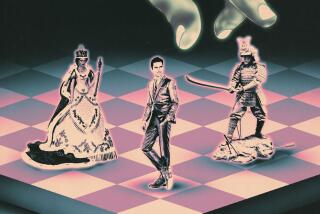Taking Off the Blinders : * In âThe Politics of Fairy Tales,â director Stephen Moore uses three one-acts to show the duplicity of fables and need to see beyond ârose-colored glasses.â
NORTH HOLLYWOOD â Parents and teachers donât always tell kids the truth. The favorite stories of childhood are not always what they seem. That fact is part of the message of juxtaposi tion of three one-acts in âThe Politics of Fairy Tales,â now playing at NoHo Studios.
Think about what are considered kiddie yarns. âGulliverâs Travelsâ is an intricate political satire of Jonathan Swiftâs era. âHuckleberry Finnâ is a serious adult novel dealing to a great extent with race relations and slavery. Even nursery rhymes are based on social and political mores. Jack and Jill were being punished for adultery in the manner of their day.
âPolitics of Fairy Talesâ director Stephen Moore has always been intrigued by what he calls in a press release âthe duplicity of fairy tales.â Thatâs why he decided to produce and stage Dennis E. Nobleâs political satire âA Gameâ as the eveningâs centerpiece, and to press home his point with modern glances at the fairy tale genre. âA Gameâ details an experiment in which three people are each given a separate part of a room as their own, and instructions to recite a slogan: âThis is my land. It is mine.â The lesson is clear.
Moore explains, âItâs about the dangers of excessive nationalism, in that if weâre all taught to be excessively nationalistic, and say, âThis property is mine, and ainât nobody else getting on it, and nobody else touching it,â we run into a lot of problems. Weâre taught by the government, or somebody, to be very nationalistic, whether itâs about our own neighborhood, or our own demographic group, or our own country. We tend to get ourselves into quite a bit of trouble by doing that. Itâs going on in Bosnia right now.â
As the people in the âGameâ are put in boxes, Moore feels that governments also try to put people in boxes. Nationalism, he says, is âvery fairy tale-ish, in that weâd rather have blinders slapped on and told to rah-rah-rah for our group, and not see what it actually takes to get to be nationally superior. Never mind that that demographic group, or that country, has to be trod underfoot. Wear those blinders, those rose-colored glasses, and everything will be fine.â
Moore discovered âGameâ about 10 years ago and last directed it in 1991 in Baltimore. He says that the modern setting of the Noble work is a departure from the first two plays in the evening. The first play is Jean Anouilhâs âAugustus,â written with Jean Aurenche, about a young man who is able to say only one word each day. He is different from everyone else, and like the characters in âGame,â is forced into another kind of box. In A.A. Milneâs adaptation of Hans Christian Andersenâs âThe Ugly Duckling,â this time about humans instead of birds, the plainness of the Princess puts her, romantically and socially, in yet another box.
âThe audience will be surprised,â Moore goes on, âmaybe taken aback, at how it all fits together. The âugly ducklingâ is a very real subject. It has become a catch-phrase in our society for people who are made to feel by their parents, by their authority figures, to feel less attractive than they are.â
*
It follows that stereotypes are ugly ducklings. The fairy tales suddenly start to get more serious in Mooreâs view.
They also get serious with his actors.
Smith Forte, who plays the Prince in âDucklingâ and the Doctor in âGame,â can be seen this fall as the lead in the upcoming feature film âNo Ordinary Love.â
âWhat I like about the plays,â Forte says, âis what ties them together, what makes them adult. They are childhood fairy tales, but the entire through-line of the show makes it adult when you cap it off with âA Game.â Itâs very evident in all the action that takes place that these are very adult themes.â
*
Forte laughs when he admits that even with the adult themes, children would probably get the points being made quicker than their seniors, because theyâre not carrying all that adult baggage to confuse issues.
Kitty McNamee was last seen on stage in Hollywood in the Tiffany Theatre production of âThe Killing of Michael Malloy.â She plays the Princess in âUgly Ducklingâ and Augustusâ love in the Anouilh play.
âThe fun of doing these roles,â she explains, âis that I can let go of everything and simply do them. If I try to bring anything extraneous to it, it wonât work. Itâs just very simple. I have to let go of a lot of baloney. Part of it is that the plays are very well written. It has to do with the archetypal images that are brought out in the plays. And the themes are so familiar to all of us.â
Emotional adult baggage, baloney, blinders. Theyâre what Moore is trying to find in his examination of these simple stories. âThatâs what fairy tales are,â he says. âThey are really rose-colored glasses.
WHERE AND WHEN
What: âThe Politics of Fairy Tales.â
Location: NoHo Studios, 5215 Lankershim Blvd., North Hollywood.
Hours: 8 p.m. Fridays and Saturdays, 7 p.m. Sundays. Ends May 15.
Price: $15.
Call: (818) 761-6127.
More to Read
Only good movies
Get the Indie Focus newsletter, Mark Olsen's weekly guide to the world of cinema.
You may occasionally receive promotional content from the Los Angeles Times.










